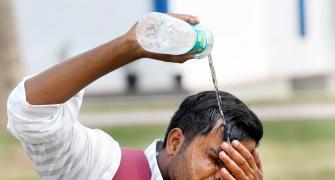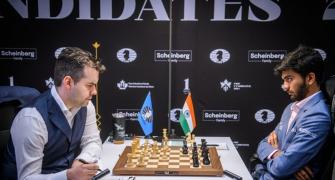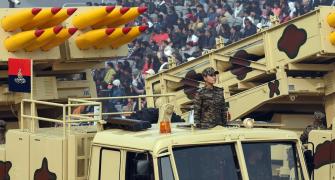Brigadier General John A Toolan, Jr, of the US Marine Corps, the principal director for South and Southeast Asia at the Department of Defence, declared, "We want to work together, and that's at the heart of that stakeholder concept and that's at the heart of the whole relationship of the strategic partnership between India and the United States."
General Toolan, who was the first speaker at a recent conference titled 'US-India Security Alliance,' hosted by the Indian American Security Leadership Council -- one of several Indian-American organisations formed last year to help push through the enabling legislation to facilitate the US-India civilian nuclear agreement -- on Capitol Hill, however, said he did not believe the relationship between Washington and New Delhi could be termed an alliance.
"Alliance is quite a bold word, and I think alliance is probably not quite the right word," he said. "Perhaps, it is more along the lines of a security partnership that allows India to maintain its non-alignment and its independence which they cherish clearly." ![]()
The general said what the US and India "are forging" is a strategic partnership "to become much like our relationships with Japan or Australia or other places, and in many ways the US would like to see the relationship grow."
"However, our relationship with India is unique and we really can't put it into any finite definition," he said, but predicted that "the United States is confident that by virtue of its overlapping values and interests that this partnership will deepen over time and without requiring a (defence) treaty."
General Toolan said India is seen "as a regional stakeholder" by the US in South Asia, as much as Washington saw the same stakeholder relationship "as we do with China," in Southeast Asia.
"The United States and India have pretty much a convergent view on the region itself and the neighbourhood that India has to operate in," he said.
Dismissing the contention in some quarters that last month's Malabar Exercise among India, the US, Australia, Japan, and Singapore is part of a strategy to ultimately contain China, the Pentagon official asserted that "the operation is not to target China, (but) it is designed to shape the strategic choices being
He said the Malabar Exercise is designed "in truth of responsible stakeholders interested in promoting peace and stability through a visible presence."
"It is important that we in these exercises make that perfectly clear. Unfortunately, if you look at some of the media today, it is as if it for the containment of China."
Earlier, in his remarks, he recalled that in President Bush's inaugural speech, "he talked about his democracy agenda," and said, "The work that is being done between the United States and India is at the heart of the President's democracy agenda."
He acknowledged that "the history books may talk more about Iraq than our development of our strategic relationship with India, (but) I think it is really a legacy for the President (in terms of the strategic partnership he fostered with India)."
The general also spoke of the "great deal of expertise," India has in "counter-insurgency operations in addressing terrorism," and admitted that "the United States can learn a lot from what India has to offer."
"For example, the Indian army has already long ago confronted IEDs in Kashmir, (while) it seemed like it was almost a novelty to our forces when we first arrived in 2003 (in Iraq)."
He also lauded India's impeccable track record with regard to nonproliferation and that said "given India's strategic location and capability, we just encourage India to continue its involvement in the Proliferation Security Initiative."
"India's participation in PSI would expose it to training and exercise, but more importantly, would serve as an example and a model for the rest of the world in that region. Again, getting back to that regional stakeholder responsibility."
He said "with regard to peacekeeping, India is the leader. They've led the efforts and they are key in the instruction and the training of peacekeeping operations and because of its vast experience in this area, the United States looks to India again to contribute to our global peace operation initiative and provide the opportunity for other nations to learn, to train, and contribute to the effort."
"Missile defence is the pillar of the next steps in this strategic framework in this strategic partnership," he said. "The US and India maintain an ongoing dialogue in missile defence."
He acknowledged that "we don't necessarily agree... and we understand that there is a different approach. But together we can work on missile defence."








